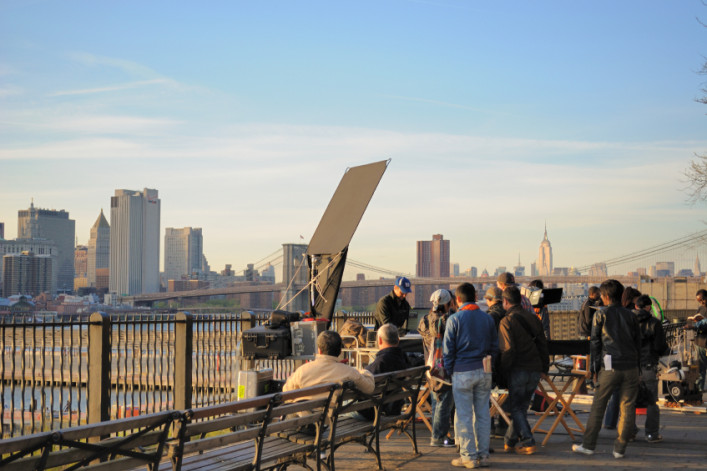Is it possible to make your apartment a star? A New York location scout tells all

Even the most nonchalant among us can be caught rubbernecking whenever we pass a film set in this city (particularly one with an unattended craft services table). And if you're like many New Yorkers looking to make a little extra cash, you may have wondered at some point if letting a film crew set up shop in your apartment for a day or two is the answer. But is it as glamorous—and lucrative—as it seems? Sam Rohn, a native New Yorker and longtime location scout and photographer, sets us straight:
- Don't expect to make this your permanent side gig. Even if you've got a dream apartment and you're open to have it filmed, it's highly unlikely it'll be your proverbial cash cow. (As we've written previously, fees are all over the map, anywhere from $500 to $10K a day.) Even if you were able to live with the chaos of constant filmmaking, your neighbors will almost certainly be less psyched, says Rohn. Plus, it's possible for locations—and entire neighborhoods—to wear out their welcome with both industry insiders, as well as the Mayor's Office of Film, Theater, and Broadcasting, which keeps close tabs on these things to prevent, for instance, a particularly scenic block from being constantly overrun with film crews. Because blocks are usually closed off for filming, limiting parking in that stretch for a considerable chunk of time and disrupting life for locals in general, "eventually the city will declare certain neighborhoods off-limits for a limited period of time. Someone has to tell the film industry ‘no, you can’t take up every parking spot in a neighborhood for three years."
- Most dingy fifth-floor walkups don't get cast. While Rohn tells us that there's always demand for a "mythical, abandoned space" or gritty, old-school warehouse that's never been seen before, when it comes to apartments, the nicer (and more convenient) yours is, the better shot you have at getting it onscreen. "A place on the ground floor (or in a building with an elevator) always makes life easier," he says. On top of that, apartments that are large, have good views, and are well-decorated tend to be in demand. (Art imitates life here, unsurprisingly.) If you're in an in-demand area like the Upper West Side, Greenwich Village, Brooklyn Heights, or Windsor Terrace, your chances are more decent than most, provided your neighborhood hasn't been oversaturated in recent months, that is.
- Know your building's policy. Whether you answer to a landlord or a co-op board, you'd be wise to run your plans by them before bringing an entire film crew into the building, and different managers will have different policies. "Some owners might be ok with [a location scout] making a deal with the individual tenant, or they might want a fee for the super, or even a fee for themselves," Rohn says, adding that "a proper production will always have insurance that will cover the entire building." Responsible producers also notify the rest of the building when there's filming, and provide details like timing and whom they can contact if issues arise.
- Make your stuff accessible. Still want to get your place noticed? Rohn advises making photos of your space easily obtainable. "Prepare a small gallery of relevant images, and send out that link to different scouts," he says. (A quick Google search of NYC location scouts will turn up plenty of options for contacts. Also, he jokes, emails full of oversized, upside-down apartment photos are one of the banes of his professional existence.) You don't have to provide your exact address at this juncture—"you could label it 'Upper West Side apartment,' for instance," he says—and consider uploading pics to a simple website or Flickr account (where the gallery can be made private), and use that link when you're contacting people and to lure in potential takers via Google image search. The Mayor's office also has tips here on how to properly publicize your place, suss out productions that are legit, and handle the logistics of a shoot.
- Even the film industry's got beef with absentee foreign owners. "The fact that so much real estate has been bought up by the 'one percent' has made less of it available for the film industry," says Rohn. "Older rich residents never needed the money, either, but maybe you'd get a resident who'd be thrilled to have Robert De Niro in their apartment." The city's shadowy foreign buyers, however, tend to value privacy above all else. As Rohn puts it, "a Russian billionaire's daughter isn't going to make that same deal."
Related:
Creepy short film "The Listing" may make you re-think your dreams of a Detroit fixer-upper
New York totally needs its own "ghost realtor"
Curious about your townhouse's (maybe sordid) history? Call in a detective
Lessons from an Astoria man who made $18,000 on Airbnb—legally
























